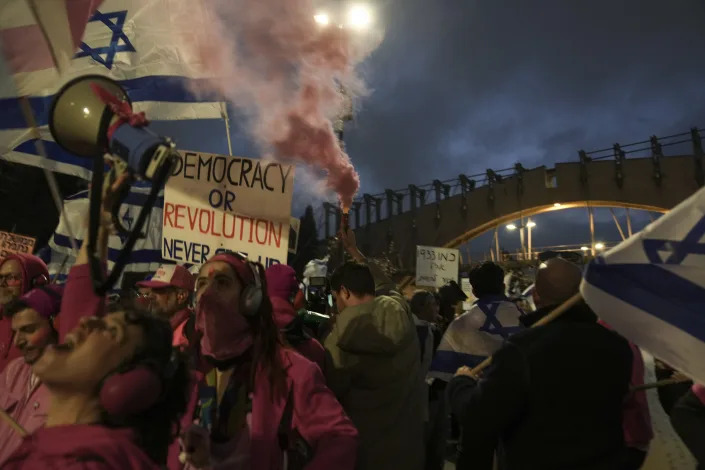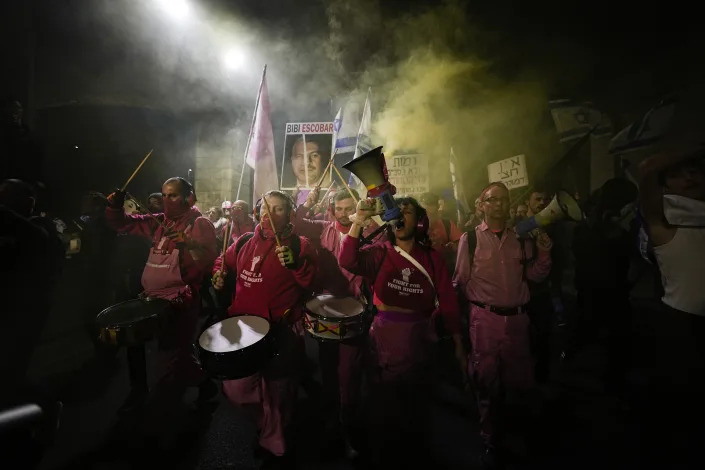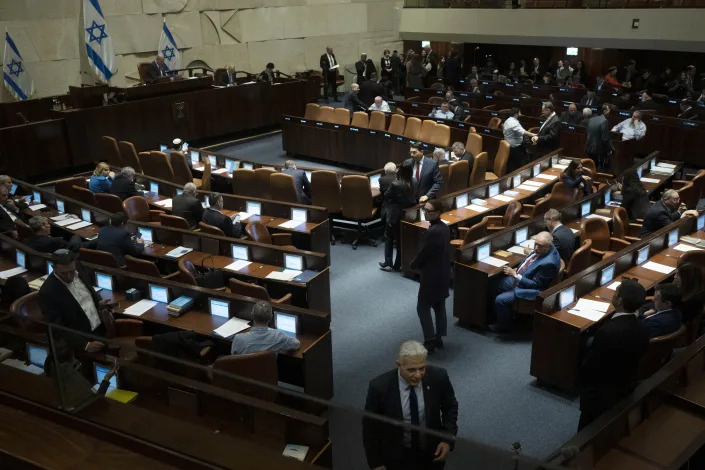
Etgar Keret: Israel's democracy is in danger
18/03/23
In Israel, protests against Prime Minister Benjamin Netanyahu's planned judicial reform have been going on for weeks. Cultural activists say Israel's democracy is in danger. Writer Etgar Keret explains why.
Etgar Keret is a superstar of Israel's literary scene. The Jewish Museum in Berlin is currently dedicating an exhibition to him titled "Inside Out" in which the author's work and life is presented. Keret, who was born in 1967 in Israel, is considered a master of short story writing and stands firm on his political views, including protesting the judicial reform in his country. "All the demonstrators have one thing in common," Keret said back in February in an interview with journalist Uri Schneider reporting for DW from Israel, "they don't want democracy to be robbed from them."
Keret is also one of the signatories of a letter to the ambassadors of Germany and the UK in Israel. In the letter, around 1,000 Israeli artists, writers and intellectuals called for Prime Minister Benjamin Netanyahu's inaugural visits to Berlin and London to be cancelled.
According to a report in the Israeli news outlet "Haaretz," the cultural activists who signed the letter say Israel is in the most serious crisis in its history and is "on the way from a vibrant democracy to a theocratic dictatorship." Prominent signatories include writer David Grossmann and sculptor Sigalit Landau. Nevertheless, Netanyahu arrived in the German capital on March 16 where he met German Chancellor Olaf Scholz and German President Frank-Walter Steinmeier.
Israelis protest proposed judicial overhaul
02:21
Less power for the Supreme Court
The new reform calls for more power for the government and less rule of law controlled by an independent judiciary. Critics accuse Netanyahu and his right-wing religious coalition of weakening the judicial system and thus undermining democracy. The government in Jerusalem, which has been in office since December, wants the reform to strengthen its influence in selecting judges, among other things.
Under the new law, the Supreme Court's powers will be restricted. Authorities justify such a move with claims that judges have interfered in politics. Netanyahu, who is in coalition with ultra-Orthodox and right-wing extremists, is currently facing trial for corruption charges. "The whole state," Keret says, "is hostage to this man who — like Nero or Caligula — considers himself more important than the state."
"This protest movement doesn't need writers to explain the world," Keret said in the interview. "Every liberal democrat understands that a court under the control of the prime minister is a weak court." The same is true, he said, if the government hires a "misogynist, homophobic racist" in the Education Ministry. "My son then learns misogynistic and homophobic attitudes. You don't have to be a genius to understand that. Everybody gets that."

A widespread protest movement
In Keret's observation, the protest movement unites people in Israel, across political divides. "In my whole life, I've never been to demonstrations with so many people with whom I have almost nothing in common," reports Keret. "To my left are hipsters with a joint in their mouth, to my right are high tech entrepreneurs, and behind me are communists. A range of rich and poor, people from the army and conscientious objectors." What they all have in common, he said, is a fear of losing democracy.
Older people in particular took to the streets. There's a reason for that, Keret said, and it's because Israel is a country of immigration. "A large part of the people who came here did so because they watched the democracies they came from collapse." Older people in particular shaped the image of the demonstrations today, he said, "They are the ones who come week after week. In the rain. In the cold. Maybe because they know the price we will pay if these government plans go through."

Religious fundamentalists in the government
The State of Israel, founded in 1948, defines itself as Jewish and democratic, Keret said. "But it's actually a Jewish state that is also democratic as a hobby." Those who talk to members of the religious camp, he said, are told: "Democracy is a temporary phenomenon." Judaism existed before and will exist after democracy, he said. "They don't care about the weakening of democracy, because in the end only God decides anyway."
The interview was conducted by Uri Schneider and this article was translated from German.
Issued on: 18/03/2023 -
Israelis gathered in towns and cities nationwide on Saturday for an 11th straight week of protests against the judicial reform plans of the hard-right government of Prime Minister Benjamin Netanyahu.
The protesters fear that the proposed reforms, which are already moving through parliament and would increase the power of politicians over the courts, are a threat to Israeli democracy.
In Tel Aviv's Dizengoff square, thousands of demonstrators waved the blue and white Israeli flag of Israel, as well as the rainbow flag of the LGBTQ community.
The demonstrators blocked roads as they set off on a march through the heart of the city. "Saving Democracy!" said one placard held aloft by the crowd.
"I'm worried not about myself, but for my daughters and grandchildren," said Naama Mazor, 64, a retiree from the city of Herzliya.
"We want to keep Israel democratic and liberal, Jewish of course, but liberal. We are very concerned it is going to become a dictatorship," she told AFP.
"There isn't a half-democracy. We're either a democracy or a dictatorship. There is nothing in between."
Sagiv Golan, 46, from Tel Aviv, said the government was "trying to destroy civil rights, women's rights, LGBTQ rights and every thing that democracy stands for... We want to show the voice of democracy."
Israeli media reported demonstrations in more than 100 towns and cities, including Haifa, Jerusalem and Beersheba.
Compromise plan nixed
Since Netanyahu's government announced the reforms in January, days after taking office, massive demonstrations have regularly taken place across Israel.
Opponents of the package have accused Netanyahu, who is on trial on corruption charge he denies, of trying to use the reforms to quash possible judgements against him. The prime minister has rejected the accusation.
Expressing concern over the deepening rift in Israeli society, President Isaac Herzog presented a proposed compromise on Wednesday, but the government immediately rejected it.
"Anyone who thinks that a genuine civil war, with human lives, is a line that we could never reach, has no idea what he is talking about," Herzog said.
Leaders of opposition parties said in a joint news conference on Thursday they supported Herzog's outline.
"The offer is not perfect," said former premier Yair Lapid. "It is not what we wanted, but it is a fair compromise that allows us to live together."
The ruling coalition, which includes ultra-Orthodox Jewish and extreme-right parties, argues the proposed reforms are necessary to correct a power imbalance between elected representatives and Israel's top court.
Immediately after Herzog's announcement, Netanyahu called it a "unilateral compromise", the "key points" of which "only perpetuate the existing situation and do not bring the required balance between the powers".
The reforms would, among other things, allow lawmakers to scrap supreme court rulings with a simple majority vote.
Other proposals would give more weight to the government in the committee that selects judges and would deny the supreme court the right to strike down any amendments to so-called Basic Laws, Israel's quasi-constitution.
(AFP)





:quality(70)/cloudfront-eu-central-1.images.arcpublishing.com/thenational/3JGRHV626IGQSQE3MBIMK6FV54.jpg)





